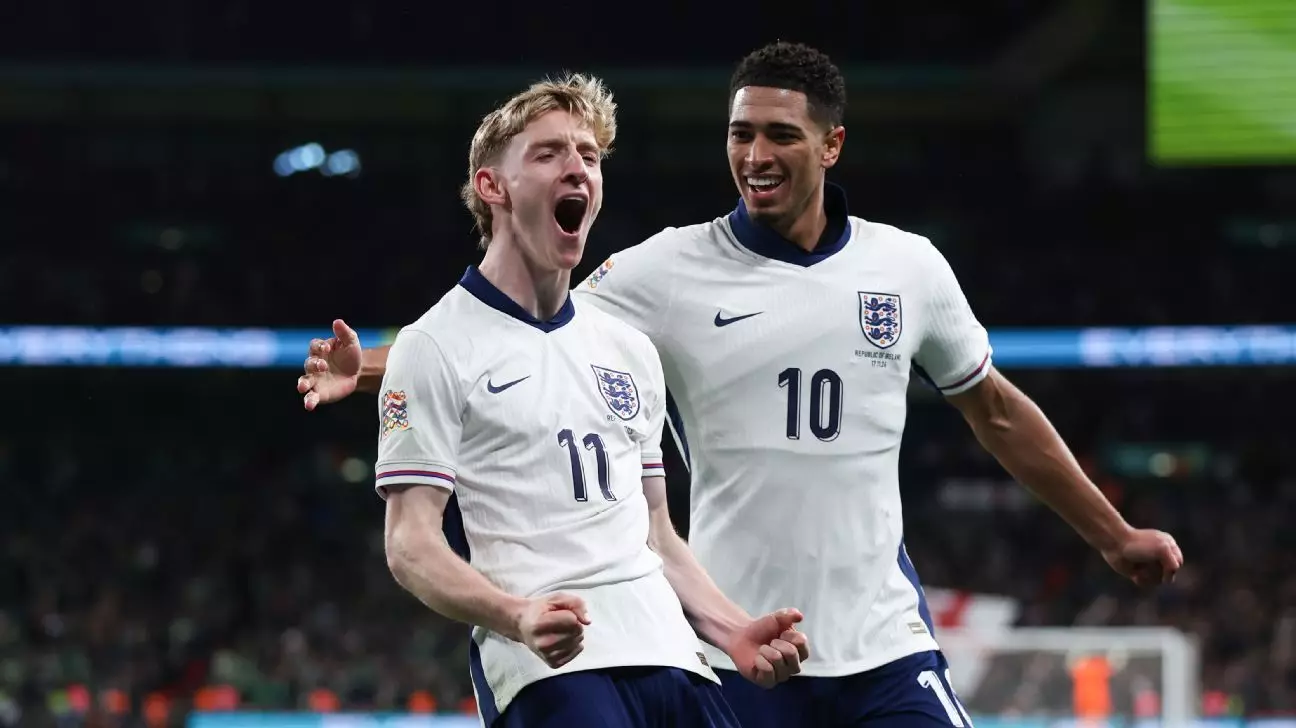As Thomas Tuchel officially steps into his role as the manager of the England national football team on January 1, 2024, he does so with the formidable task of steering the squad toward success in the 2026 World Cup. His immediate goal is clear: to cultivate a team capable of capturing the coveted title and thus breaking England’s 60-year drought in major tournaments. With England’s recent decisive 5-0 victory over the Republic of Ireland, the team has secured its return to the upper echelon of the UEFA Nations League, eliminating the need for a precarious playoff scenario. Tuchel’s appointment comes with an 18-month contract, a period that underscores the urgency and singular focus of his mission.
Under the previous stewardship of Gareth Southgate, England showcased significant progress, reaching back-to-back finals at the UEFA European Championships and finding a solid interim manager in Lee Carsley, who enjoyed remarkable success during his brief tenure. The recent match against Ireland demonstrated the depth and potential within the squad, highlighted by standout performances from players like Harry Kane, Anthony Gordon, and Conor Gallagher. Yet, despite these accomplishments, Tuchel is confronted with numerous challenges that could shape the future of English football and its international ambitions.
A focal point for Tuchel upon his arrival will undoubtedly be the situation surrounding Harry Kane. As England’s captain and all-time leading scorer, Kane possesses the experience and influence necessary to drive the team forward. However, recent comments have hinted at unrest related to player commitment, especially in context to withdrawals over the international break. Kane’s assertion that playing for England requires unwavering dedication reflects his leadership ethos, even as questions loom over his own status within the squad.
Kane’s dual role as a traditional striker and a deeper playmaker has led to discussions on his adaptability within Tuchel’s potential tactical framework. The challenge lies in incorporating Kane’s considerable talents while maneuvering around the emerging threats posed by younger players like Ollie Watkins and Dominic Solanke, who excel in pace and dynamic gameplay. Tuchel’s tactical expertise will play a pivotal role in determining whether he can seamlessly integrate Kane’s style into a more aggressive, pressing system reminiscent of his Chelsea days.
An area that demands Tuchel’s immediate attention is the midfield’s ability to control the tempo of matches. The perception that England often struggles during critical phases—evidenced during disappointments in previous tournaments—highlights the need for a reliable midfield orchestrator who can dictate play. As the squad transitions under Tuchel, emphasis might be placed on fostering creative relationships among players. The likes of Declan Rice, Jude Bellingham, and Conor Gallagher will need to step into more substantial roles, capable of both defensive solidity and attacking threat.
Tuchel is known for his tactical versatility and has frequently employed formations such as the 4-2-3-1, 4-3-3, and 3-4-2-1. Each formation’s efficacy against different opponents will necessitate strategic adjustments, especially as Tuchel seeks to balance control of possession with the threat of counterattacks. This adaptability will be crucial in ensuring that England excels against diverse playing styles in the tournament.
Beyond the tactics and player selections, the task of nurturing a positive team culture, which flourished under Southgate, will be crucial for Tuchel. Player morale and cohesion could significantly influence performance, particularly in high-stakes matches. There are indications of underlying issues within the camp, as suggested by the 2024 Euro experience, and Tuchel’s ability to quickly instill a sense of unity and purpose will be imperative. Engaging players like Kane and Rice—as established leaders—to reinforce the culture could ensure a smoother transition amid changes.
Moreover, with the emergence of talented youngsters, school environments at youth level have created a generation of players accustomed to winning. This psychological edge will benefit Tuchel as he aims to construct a winning mentality capable of triumphing on the world stage.
Tuchel’s arrival as England’s head coach symbolizes both a renewed hope and a daunting challenge. With a distinct focus on immediate success, he must blend experience with the fresh vibrancy of youth while ensuring that tactical coherence and team spirit reign supreme. As the World Cup in 2026 looms on the horizon, all eyes will be on how Tuchel navigates the complexities of international football, the expectations of a passionate nation, and the unpredictable nature of the beautiful game. The future is uncertain, but the potential is vast—a fitting canvas for Tuchel’s tactical genius and leadership to be put to the test.
